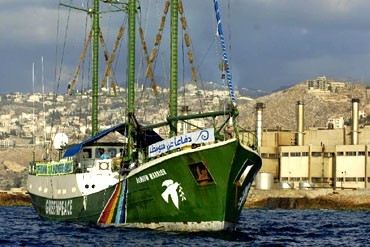Beirut (Lebanon), September 29, 2006 – Greenpeace today handed over shell fish samples collected by Greenpeace divers from the deck of its flagship the Rainbow Warrior as part of the international efforts to mitigate and assess the impact of the environmental damage caused by the recent oil spill.
Under the direction of Italian scientists(1) and in collaboration with the American University of Beirut, Greenpeace divers have collected oysters from 6 locations(2) along the Lebanese coast for scientific analysis.
“There is no doubt that the recent release of 10 – 15,000 tones of fuel oil into the Lebanese waters represents an environmental catastrophe with consequences on marine life. However, without scientific analysis, the true extent of the impact is unknown. We were very happy to provide the Rainbow Warrior and professional divers for the collection of samples when asked by the Italian Ministry of Environment delegation to Lebanon for our help” said Jim Footner, Greenpeace Rainbow Warrior Project Leader.
“We are grateful to Greenpeace for their help in providing us with samples that could form part of the long term assessment work that will be carried out in Lebanon. In collaboration with the American University of Beirut, the samples will be tested for signs of contamination caused by the presence of oil in the water.” said Dr. Gian Carlo Bueri, Head Scientist with the Italian mission.
“The variety of the samples provided by Greenpeace will enable the American University of Beirut to undertake scientific analysis of signs of contamination from other sources that pose environmental hazards in the Lebanese waters, such as toxic chemicals and sewage outflow.” Said Dr. Barbour, Zoonoses Professor in American University of Beirut.
“We hope this work will contribute to an overall environmental assessment of the recent conflict that urgently needs to be carried out.” Concluded Jim Footner from Greenpeace.
Greenpeace is calling for a comprehensive region wide post conflict environmental impact assessment to be carried out that assesses not only the damage caused by the oil spill, but the conflict as a whole.
Notes:
(1) The Italian organizations involved include the Central Institute for Marine Research, and the Italian Environmental Protection Agency.
(2) Ali Arab (North of Tyr) – Sarafand – Ras Beirut – Tabarja – Amcheit – Barbara.
This information was provided by Greenpeace Lebanon
